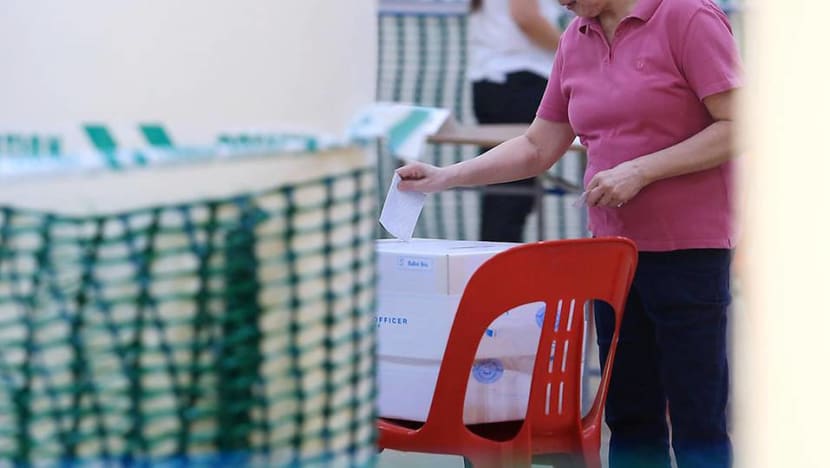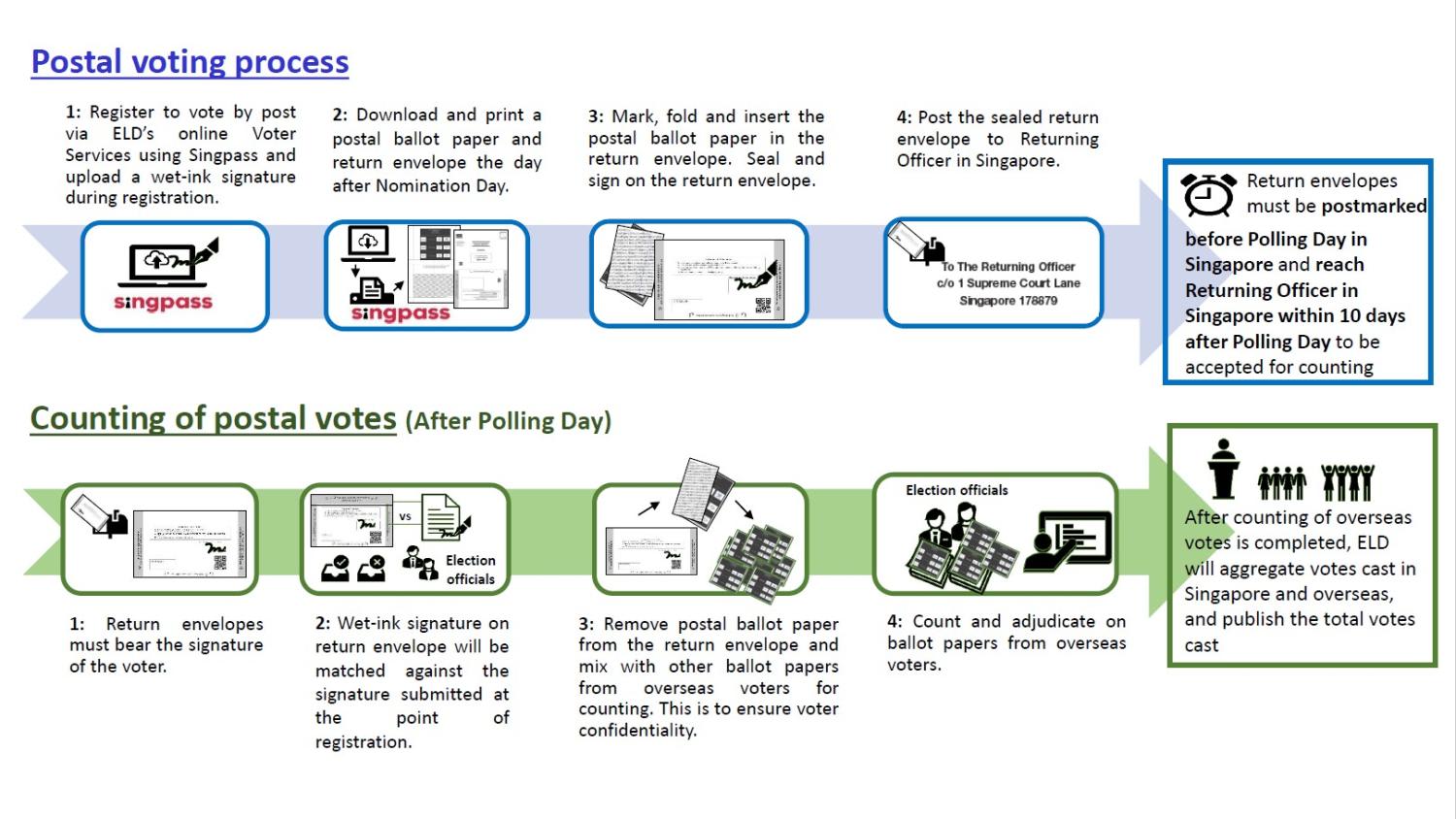Postal voting for overseas Singaporeans and other changes that will be made to elections laws
Amendments to Singapore’s elections laws include giving nursing home residents special voting arrangements, as well as updating election advertising laws.

File photo of a voting booth in Singapore. (Photo: TODAY)
SINGAPORE: Eligible Singaporeans living overseas will be able to vote by post in future elections as part of changes to the country’s election laws passed in Parliament on Monday (Mar 6).
Other changes include having special voting arrangements for nursing home residents and updates to rules for online election advertising.
These amendments to the Presidential Elections Act and Parliamentary Elections Act are in line with the Elections Department’s (ELD) “continuous efforts to enhance … electoral processes and election administration”, said Education Minister Chan Chun Sing as he tabled the Bills for a second reading.
“These proposals will help to enhance voter accessibility, and engender greater trust and confidence in our election administration and electoral processes,” said Mr Chan, who is also Minister-in-charge of the Public Service.
The Bills were passed in Parliament, although the nine Members of Parliament (MPs) from the Workers’ Party (WP) abstained from the vote to amend the Presidential Elections Act.
“The Workers’ Party maintains its position on being opposed to the office of the elected president,” said WP chairman Sylvia Lim.
Here are the key changes you need to know:
1. POSTAL VOTING FOR ELIGIBLE SINGAPOREANS LIVING OVERSEAS
This new option will allow those living overseas to vote even if there are travel disruptions, said Mr Chan, adding that ELD will implement “processes supported by technology” to assure the integrity and secrecy of postal voting.
These include registration on ELD’s online voter services with the use of Singpass. Those who wish to vote by post will need to upload a wet-ink signature which will be used for authentication.
After Nomination Day, postal voters will be able to go on ELD’s online voter services to download and print their postal ballot paper and pre-paid return envelope.
They will then have to mark their vote on the self-printed ballot paper, before folding and inserting the ballot paper in the return envelope. Return envelopes must be sealed and signed by voters, and posted before Polling Day in Singapore.
The latter will ensure that all votes are cast before polls are closed in Singapore so that voters residing in a time zone that is behind Singapore do not cast their votes after knowing the results of the local poll, Mr Chan said.

Postal votes will have to reach ELD within 10 days after Polling Day to be accepted for counting.
To make sure that only “bona fide” postal ballot papers are counted, a pre-count process will be done to sieve out return envelopes which do not meet the criteria for counting.
For example, the return envelope must bear the signature of the voter given during registration and an official QR code which is unique for each voter. The QR code enables the wet-ink signature on the return envelope to be matched against the signature provided during registration.
To ensure voting secrecy, postal ballot papers will be removed from the return envelopes and mixed with other overseas ballot papers before the start of counting, said Mr Chan, adding that candidates and counting agents will be able to observe this entire process.
Ahead of the upcoming presidential election, which must be held by Sep 13 this year, ELD will demonstrate the process and the system to be used to the media and political parties, the minister said.
Ms Lim said the WP supports the implementation of postal voting, describing the current scheme of requiring those overseas to cast their votes in-person at the 10 polling stations in six countries as “severely” limiting the ability of overseas Singaporeans to vote.
This new option is a “positive development” which has “the potential of empowering many more overseas Singaporeans to have their say” in the national polls, she added.
2. GREATER CONVENIENCE FOR NURSING HOME RESIDENTS
The amendments passed on Monday will also allow nursing home residents to get “special polling arrangements”, making it more convenient for them to cast their votes there, announced Mr Chan.
Such arrangements include setting up a special polling station within the premises of the nursing homes, and deploying mobile polling teams to collect ballot papers from bedbound voters in the nursing homes.
For a start, ELD will run a pilot involving 25 to 30 nursing homes, each with more than 50 voters. This will reach more than 2,000 voters, which make up about two-thirds of registered voters currently residing in nursing homes, added Mr Chan.
The selected nursing homes will be made public on Nomination Day, if the election is contested. The selection process will take into consideration factors such as “the number of voters in the nursing home and the practicality of deploying the mobile polling teams, taking into account the resources required”.
In response to MP Louis Ng’s (PAP-Nee Soon) question on how the Returning Officer would establish special polling stations in a nursing home, Mr Chan said ELD has engaged the Health Ministry to understand the profiles of the residents and in-patients. ELD also visited these nursing homes to understand their “unique context and environment”.
Meanwhile, WP’s Ms Lim had asked how the nursing home would handle patients with limited mental capacity, such as those with dementia or Alzheimer’s.
“We will adopt the same approach as that for regular polling stations. That is, before the issuance of (the) ballot paper, the election official will request the voter for his identification documents and poll card. If the voter does not respond to the election official’s request … after a few attempts, the voter will not be issued a ballot paper,” said Mr Chan.
“If the ballot paper has been issued, but the voter is somehow unable to mark the ballot, the election officials will seek the agreement of the polling agents present that the voter will be allowed to cast a blank vote.”
Related:
3. UPDATES TO ELECTION ADVERTISING LAWS
Here are five amendments involving online election advertising (OEA) which will take effect under the revised legislation.
First, the scope of OEA has been extended to include amplifying access, such as boosting, reposting, sharing or resharing of existing OEA.
Amplifying access increases the reach of the original content to more users and “has a similar effect to publishing fresh content”, hence should be held to the same requirements, explained Mr Chan.
Second, amplifying access to OEA content which was published before the cooling-off period during Cooling-off Day and Polling Day is prohibited, added Mr Chan.
This is in line with the updated scope of OEA.
The exceptions to the cooling-off period ban will be retained, including for private and domestic communications, such as sharing election-related content within a private chat or closed group with family or a small group of friends.
Third, OEA content will now be considered to be published in Singapore if the content is accessible from Singapore or if it originates in Singapore, he added.
Fourth, the particulars of the person who approved OEA content must now be shown.
This is in addition to what is currently required: The particulars of the person who is responsible for publishing the content, as well as the person who directed it to be published. If the OEA is paid for, it should also show the particulars of the person who paid for it.
Fifth, the Returning Officer will now have expanded powers in addressing OEA breaches.
This will allow him to issue corrective directions to “any content publisher, including social media companies”, to remove or disable access in Singapore to the OEA, or to stop or reduce electronic communication activity involving the OEA, said Mr Chan.
The Returning Officer can also specify that the corrective actions must be taken within a certain period of time, so that breaches are addressed promptly during the short campaigning period.
Currently, the Returning Officer only has powers to issue directions to candidates or their election agents to address certain OEA breaches.
To maintain coherence in the treatment of online and offline election advertising, the published-by requirements, including new additions such as the particulars of those who approved the content, will also apply to non-OEA.
Responding to the amendments involving election advertising, WP’s Ms Lim asked why there was “no consultation or prior information” about these changes, given that these provisions impact the work of political parties “most directly”.
She noted that the changes to election advertising were “very detailed and must have been under consideration for quite some time”, yet the changes were announced just a month ago.
In comparison, ELD had reached out to political parties on the proposal to include postal voting and nursing home voting, which was a “welcome and useful process”, she added.
Mr Chan did not address Ms Lim’s observations.
4. OTHER CHANGES TO IMPROVE ELECTION PROCESSES
The revised legislation will also clarify and improve the election processes via three key amendments.
First, the Returning Officer will be allowed to set up polling stations in the “adjacent electoral division” if it will benefit a large number of voters living near the electoral boundary.
The current rules only permit a polling station to be situated within the electoral division boundary.
Second, all individuals below 16 years old will be prohibited from taking part in election activities. This “age-based” restriction is a “more consistent approach”, explained Mr Chan.
The current rules prohibit “a person attending a primary or secondary school as a student” from taking part in election activities.
Third, the ban on foreigners from participating in election activities will be extended to foreign entities such as foreign firms. This ensures that “Singapore politics is only for Singaporeans to decide”, the minister said.
Amendments were also made to the Presidential Elections Act with the aim of streamlining the presidential election processes.
These include removing the requirement for the Presidential Elections Committee to consider applications from those below 45 years old, and allowing the committee to reject an application from those who do not submit a community declaration for the community that the election is reserved for.


















